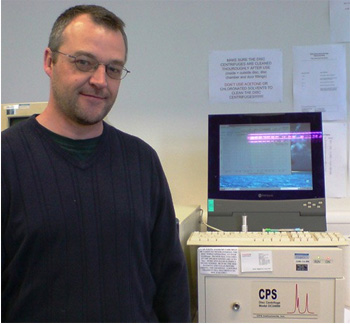Analytik, leading suppliers of innovative analytical instrumentation, talk about the particle characterisation work performed by Professor Steve Armes and his team in the Department of Chemistry at the University of Sheffield.
Among the research interests of Professor Steve Armes is the synthesis and characterisation of colloidal systems. His group has used disc centrifuge photo-sedimentometry to size a wide range of latexes, sols and colloidal nanocomposite particles over the last fifteen years. One of the tools used is the high resolution 24,000 rpm disc centrifuge from CPS. This has delivered reliable results with a wide range of latexes and nanocomposite particles. This new instrument has a maximum centrifugation rate of 24,000 rpm, which is substantially faster than the older Brookhaven disc centrifuge (15,000 rpm). This means that much smaller particles can now be sized with good accuracy and reproducibility.
 Professor Steve Armes from the University of Sheffield with his CPS Disc Centrifuge system.
Professor Steve Armes from the University of Sheffield with his CPS Disc Centrifuge system.
The CPS disc centrifuge has proved to be particularly useful for sizing a family of new poly(2-hydropropyl methacrylate) latexes prepared by aqueous dispersion polymerisation (see A. M. Ali et al., Soft Matter, 2007, 2, 1003-1013). Since poly(2-hydroxypropyl methacrylate) is soluble in alcohol, these particular latexes become swollen in methanol/water mixtures, which is the normal spin fluid used for the Brookhaven instrument. This means that the solid-state particle density determined by helium pycnometry is no longer applicable, which invalidates the particle size measurement. In contrast, the wholly aqueous spin fluid used in the CPS disc centrifuge prevents latex swelling and allows meaningful particle size analyses to be performed. Other advantages offered by the CPS disc centrifuge include its Windows software and straightforward mode of operation which is well suited to sizing the many different samples encountered within a typical laboratory day. This is additionally useful to the Armes research group as they also offer a particle size analysis service to industrial companies.
Discussing his use of the CPS, Professor Armes said, "We have shown that the CPS disc centrifuge offers a very convenient means of verifying whether silica redistribution occurs when polymer-silica nanocomposite particles are challenged with excess latex. Such redistribution is accompanied by incipient flocculation, which is readily detected if the challenging latex is chosen to have a different size to the original nanocomposite particles. Although we have also characterised silica redistribution using small-angle x-ray scattering, electron microscopy and x-ray photoelectron spectroscopy, we find that the CPS disc centrifuge is the easiest and most convenient technique for simply establishing whether this phenomenon has occurred or not. The CPS instrument has proved to be an indispensable characterisation tool in our research programme and it should provide us with robust, reliable particle sizing capability for many years to come."